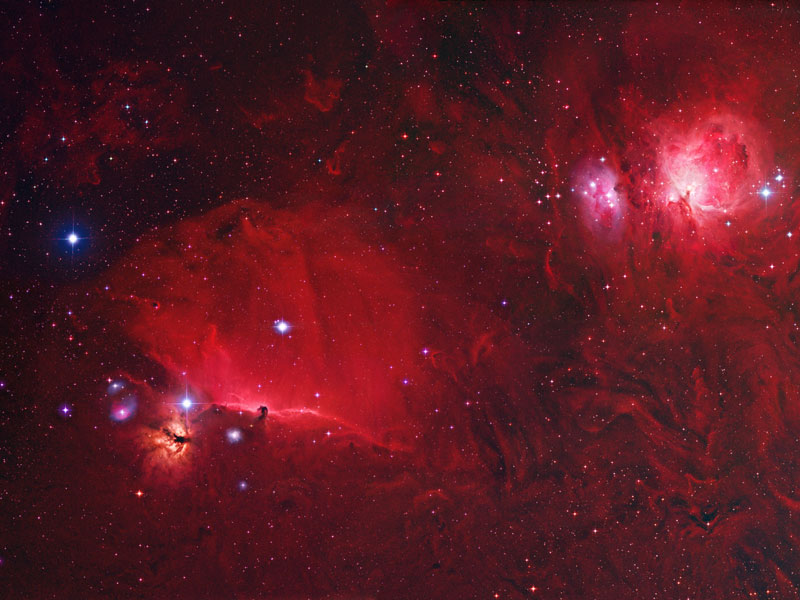Credit & Copyright: Robert Gendler
Explanation:
Adrift 1,500 light-years away in one of
the night sky's
most recognizable
constellations, the glowing
Orion Nebula and the dark
Horsehead Nebula are contrasting
cosmic vistas.
They both appear in this stunning composite digital image
assembled from over 20 hours of data that includes exposures
filtered to record emission from hydrogen
atoms.
The view reveals extensive
nebulosities associated with
the giant Orion Molecular
Cloud
complex, itself hundreds of light-years across.
The magnificent emission region, the
Orion
Nebula (aka M42), lies at the
upper right of the picture.
Immediately to its left are a cluster of
of prominent bluish
reflection nebulae sometimes called
the Running Man.
The Horsehead
nebula appears as a dark cloud, a small silhouette
notched against the long red glow at the lower left.
Alnitak is the easternmost star in Orion's belt and
is seen as the brightest star to the left of the Horsehead.
Below Alnitak is the
Flame Nebula, with clouds of
bright emission and dramatic dark dust lanes.
Fainter tendrils of glowing hydrogen gas are easily traced
throughout the region in
this
Orion deep field.
1999 2000 2001 2002 2003 2004 2005 2006 2007 2008 2009 2010 2011 2012 2013 2014 2015 2016 2017 2018 2019 2020 2021 2022 2023 2024 2025 2026 |
Январь Февраль Март Апрель Май Июнь Июль Август Сентябрь Октябрь Ноябрь Декабрь |
NASA Web Site Statements, Warnings, and Disclaimers
NASA Official: Jay Norris. Specific rights apply.
A service of: LHEA at NASA / GSFC
& Michigan Tech. U.
|
Публикации с ключевыми словами:
Orion - Horsehead Nebula - Туманность Ориона - туманность Конская Голова
Публикации со словами: Orion - Horsehead Nebula - Туманность Ориона - туманность Конская Голова | |
См. также:
Все публикации на ту же тему >> | |
